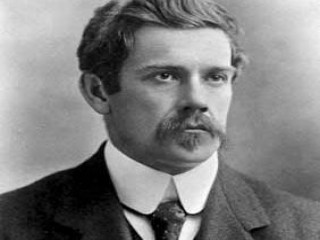
John Millington Synge biography
Date of birth : 1871-04-16
Date of death : 1909-03-24
Birthplace : Dublin, Ireland
Nationality : Irish
Category : Famous Figures
Last modified : 2011-02-28
Credited as : Drama writer, playwright, collector of folklore
The Irish dramatist Edmund John Millington Synge, one of the greatest playwrights of Dublin's Abbey Theatre, made the folklore and dialect of the Irish peasantry the subject of his plays.
John Millington Synge was born on April 16, 1871, in Rathfarnham, a suburb of Dublin. He was the youngest of the eight children of John Hatch Synge, a lawyer who died when John Millington was an infant, and Kathleen Traill Synge, the daughter of a Protestant clergyman. As a child, Synge showed signs of the tubercular condition that claimed his life at the age of 38.
Synge attended private schools in Dublin and was awarded a bachelor of arts degree by Trinity College in 1892. He then traveled to Germany, intending to study the violin; but after a year of wandering, he joined the diversified group of Irish expatriates then studying in Paris. There Synge lived an almost ascetic life in the midst of bohemian surroundings, a pattern his later life also followed.
Synge's career took an unexpected turn in 1896, when he was introduced to William Butler Yeats in Paris. The older Irish poet urged Synge to abandon his French studies and to devote himself to a study of his own people and their culture, for which his knowledge of Gaelic had well prepared him. Synge took Yeats's advice. After intensive research in the remote Aran Islands and in County Wicklow, he presented his first play, The Shadow of the Glen (1903), to the Irish National Theatre. Irish newspapers greeted it as "an insult to every decent woman in Ireland."
In 1904 Synge became codirector of the Abbey Theatre with Yeats and Lady Augusta Gregory. The Abbey produced his classic tragedy of the Aran Islands, Riders to the Sea, in 1904. Synge's plays met with continued hostility because of their seeming slight to Irish country people. Audiences walked out of The Well of the Saints (1905); The Tinker's Wedding (1907) has never been produced professionally in Ireland.
Synge's comic masterpiece, The Playboy of the Western World (1907), caused riots upon its presentation both in Dublin and in the United States. The author once commented mildly on the furor caused by his work, "We shall have to establish a Society for the Preservation of Irish Humor." His last play, Deirdre of the Sorrows (1909), was produced posthumously; it was found nearly completed in the Dublin nursing home where Synge died on March 24, 1909. He had been nursed in his final illness by Marie O'Neill, a leading actress of the Abbey Theatre, whom he had hoped to marry.
An early and still useful biography of Synge is Maurice Bourgeois, John Millington Synge and the Irish Theatre (1913). Several later studies bring to light information not available to his first biographer: David H. Greene and Edward M. Stephens, John Millington Synge, 1871-1909 (1959); Daniel Corkery, Synge and Anglo-Irish Literature (1965); and Donna L. Gerstenberger, John Millington Synge (1965).
On Synge's work with the Abbey Theatre, Alan Price, Synge and Anglo-Irish Drama (1961), and Elizabeth Coxhead, John Millington Synge and Lady Gregory (1962), provide the necessary background, while Adelaide D. Estill, The Sources of Synge (1939), discusses the materials Synge used in his plays. The best short study of Synge is Denis Johnston's pamphlet, John Millington Synge (1965). Important references to Synge are in William Butler Yeats, Autobiographies (1914; repr. 1961), and valuable essays on him are in Robin Skelton and David R. Clark, eds., Irish Renaissance; A Gathering of Essays, Memoirs and Letters from the Massachusetts Review (1965), and Robin Skelton and Ann Saddlemyer, eds., The World of W. B. Yeats: Essays in Perspective (1965).
















